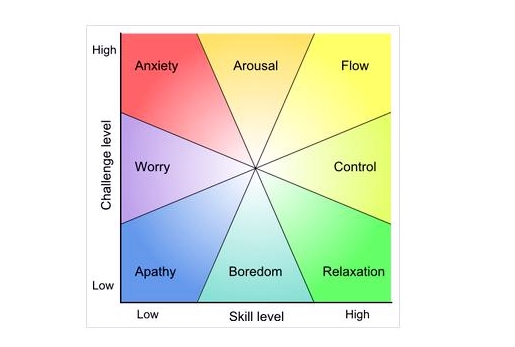Flow States

A flow state is often referred to as “being in the zone.” It occurs when an individual is so absorbed in an activity that he or she loses track of time, his or her senses are heightened and an effortless momentum takes place as action and awareness merge. Flow combats both anxiety and depression.
Psychologist Mihaly Csikszentmihalyi introduced the concept in his 1990 book, Flow: The Psychology of Optimal Experience. He developed the term “flow state” after numerous individuals described optimal times when “their work simply flowed out of them without much effort.” Csikszentmihalyi identified eight characteristics of flow that include: complete concentration on a task, which is intrinsically rewarding; the merging of action and awareness; a balance between challenge and skill; clear goals; effortlessness and ease; a feeling of control; immediate feedback; the lack of awareness of physical needs; and the transformation of time (as it either speeds up or slows down).
Flow activities can be physical, creative or simply day-to-day tasks and encompass biking, running, swimming and other sports; cooking; crossword puzzles; drawing; gardening; hair braiding; hiking; listening to or playing music; making friendship bracelets; photography; reading; Tai Chi; writing; and woodworking. A universal experience, flow has been reported across genders, social divisions and varying ages and cultures.
Because multitasking and distractions disrupt flow, finding a quiet environment, setting your phone to “Do Not Disturb” and putting it away, and closing all social media and E-Mail tabs on your laptop are the first step. Listening to repetitive types of music without vocals, like classical or electronic dance, with which you are already familiar will further improve your ability to hyperfocus. Try doing something you love; and create a series of actions you complete every time you are about to begin. A task’s challenge level is important to achieving a flow state as well. If it is too high, anxiety or stress can result. Should your skill level greatly exceed it, you likely will be bored.
Determine your Biological Peak Time, the period of the day when your mind is energized and sharp, and you are your most creative and productive. What you drink also matters. Consuming a single cup of coffee before you start working and ensuring that you are fully hydrated will each improve your ability to focus. (Often when individuals are sluggish and lack energy, they are dehydrated and simply need to drink more water.) Consider having a “later list” beside you where you can write any To Do Items that pop into your head while you are in a state of flow. Finally, finding time to engage in a creative activity you enjoy, which is more likely to lead to flow, can improve your well-being by increasing your motivation and self-esteem.
Self-doubt, stress and worry tend to disappear during flow states and being in one can increase creativity, contentment, fulfillment, productivity and, perhaps most importantly, happiness. Research shows that people who regularly experience flow have lower levels of depression and anxiety.